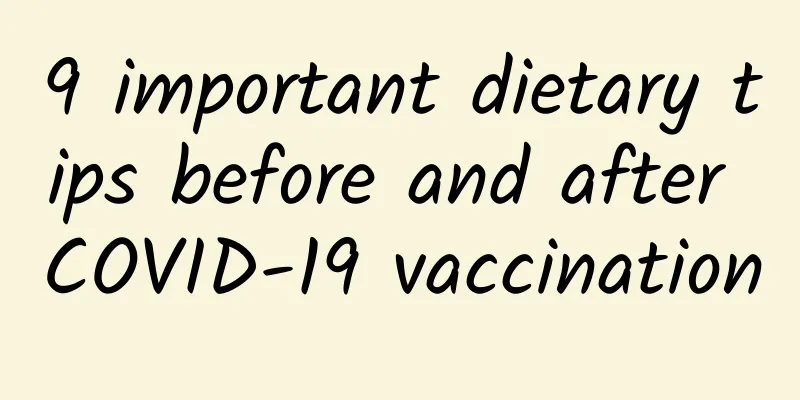9 important dietary tips before and after COVID-19 vaccination

|
1. Get enough sleep and avoid staying up late Numerous studies have confirmed the importance of adequate sleep to immune function, and it is also crucial to the long-term immune memory produced by vaccines. As early as 2011, German scientists discovered that subjects who were deprived of sleep on the night of hepatitis A vaccination had only half as many antibodies and specific T cells as those with normal sleep one year after vaccination. In 2021, a review article published by Professor Tang Xiangdong's team at West China Hospital of Sichuan University in the international academic journal Sleep Breath showed that lack of sleep after COVID-19 vaccination significantly reduces the protective effect of the vaccine. Therefore, it is advisable to rest early and go to bed early a few days before and after vaccination, and never stay up late. Shift workers should choose to get vaccinated when they are not on night shift. 2. Pay attention to rest before and after vaccination to avoid fatigue In order to allow the body to focus on the immune response, unless it is necessary, strenuous exercise can be temporarily stopped within two or three days before and after vaccination, and aerobic exercise can be maintained. On the premise of adequate rest and no adverse reactions, high-intensity exercise can be resumed two or three days after vaccination. Similarly, overtime work or staying up late should be reduced to avoid fatigue and stress on the body. 3. Stop dieting and eat well The human body stimulates an immune response through vaccines to produce sufficient antibodies, but it also requires the cooperation of a variety of nutrients. ❶ Protein is the most important. Cytokines, complement, and antibodies are all made from protein; ❷ Various B vitamins act as coenzymes and participate in the synthesis of immune factors and antibodies; ❸ Vitamin A and vitamin C are necessary for the normal functioning of the immune system. The immune stimulation process will increase the consumption of vitamin C, so it is best to supplement it; ❹ When vitamin D is insufficient, the immune system is disrupted, and the risk of severe infection and death increases; ❺ Zinc is involved in the immune response, and when iron is insufficient, the immune system function declines; ❻The immune response consumes energy, so the total calories of three meals must be sufficient; ❼During the inflammatory response, in order to protect the body, the cooperation of a variety of antioxidants is also needed. It is also essential to consume fruits, vegetables and grains containing these substances. It can be seen that you must eat well before and after vaccination. Otherwise, the amount of antibodies produced will be insufficient and the effectiveness of the vaccine will be compromised. 4. Supplement protein and trace elements appropriately If you are not confident about your nutritional base, you may consider increasing your nutritional supply appropriately before vaccination and taking vitamin and mineral supplements after vaccination. For example, people who used to eat less protein can increase the amount of fish, meat, eggs, milk and soy products in advance. People who do not eat enough vegetables and fruits on a daily basis should eat more fresh vegetables and fruits. They can also take 200 to 300 mg of vitamin C tablets every day. This dose is safe. You can also take a multinutrient supplement every day before and after the vaccination. 5. Be careful when eating seafood, freshwater fish and other foods that may cause allergies Because vaccination can stimulate the immune system, the response to some common allergen foods may also change. For some people with sensitive constitutions, those who usually do not have obvious allergic symptoms to seafood and river food may have temporary allergic reactions. Although it is not dangerous for most people to eat it, it is safer not to eat it for insurance purposes. In addition to seafood and river fish, if you have ever had an allergic reaction to foods such as buckwheat, pineapple, lamb, and eggs, you should also avoid eating them. 6. Avoid foods that cause excitement Coffee and strong tea will affect rest, and eating too much spicy food will also make the body excited, which may not be conducive to achieving the best immune response effect. Of course, if you are used to drinking tea and coffee on a daily basis, and it does not cause excitement and insomnia, you can drink it normally. People who are used to eating spicy food on a daily basis have already adapted to these ingredients, and there is no need to suddenly stop the habit of eating spicy food. 7 Food Restrictions That May Increase Inflammation Inflammatory factors are produced during the immune response, and excessive inflammatory response can damage body tissues, so the intake of foods that promote inflammatory response should be reduced at this time. Fried, smoked, and grilled foods, as well as processed red meat products, are rich in pro-inflammatory factors and should be avoided at this time. Excessive intake of high-saturated fatty acid foods such as beef and mutton, as well as sweets and sweetened drinks, can also promote inflammatory responses, so the amount of these foods should be controlled. 8. Eat fresh fruits and vegetables and whole grains every day These foods can help supply adequate antioxidants and multiple vitamins, which are necessary to ensure a smooth and healthy immune response. 9. Avoid alcohol and take medication with caution Previous experience shows that drinking alcohol after vaccination may interfere with the immune response or aggravate adverse reactions after vaccination. Immune response products such as antigen-antibody complexes need to be processed and broken down by the liver and then discharged into the intestine for elimination. Immune stress will increase the burden on the liver, and drinking alcohol will also increase the burden on the liver. To be on the safe side, do not drink alcohol a few days before and after vaccination. |
Recommend
Can pregnant women use eyebrow pencil?
Everyone loves beauty, and the same is true for p...
What are the taboos for eating plum blossoms? What are the flavors of plum blossoms?
Plum, orchid, bamboo and chrysanthemum are the fo...
Briefly describe the cyclical changes of the ovaries
As female friends grow older, the uterus and ovar...
Is it normal to have periods at the age of 11?
Girls have always needed menstruation, which is a...
Can you still have a pleasant chat? - Bad breath, the biggest enemy of social interaction, revealed
Author: Chen Hua, Shenzhen University General Hos...
What are the physiological reactions of girls?
Many people think that women have no physiologica...
What is the incidence of breast cancer?
Now more and more women are suffering from breast...
Where to press your fingers to induce menstruation
Sometimes female friends always find that their m...
What is the reason why the color of the female thigh root turns dark
Many women will experience changes in skin color ...
Counterpoint: Global 5G mobile phone shipments will increase by 20% year-on-year in the first half of 2024
Market research firm Counterpoint Research said t...
There are red blood streaks in the vaginal discharge
Leucorrhea can also reflect the health of a woman...
Can pregnant women eat inulin?
As we all know, inulin is highly nutritious and h...
What should I pay attention to when cooking shrimp? Other foods that cannot be eaten with shrimp
From the perspective of traditional Chinese medic...
The most expensive container in the world is in you and me.
If a basin of water is not placed properly, the w...
Rib pain during pregnancy, stay away from these causes!
Many pregnant women find themselves experiencing ...









